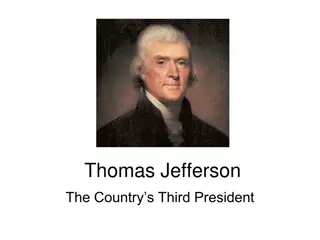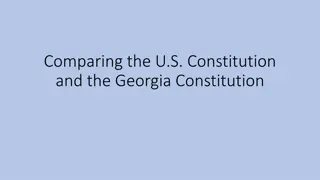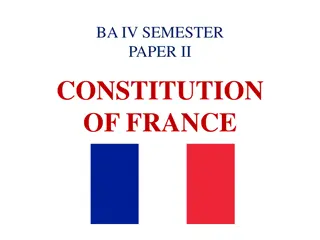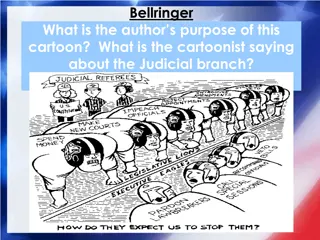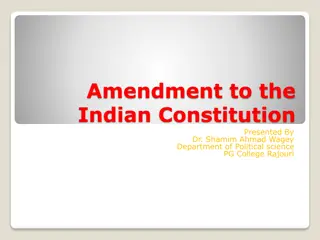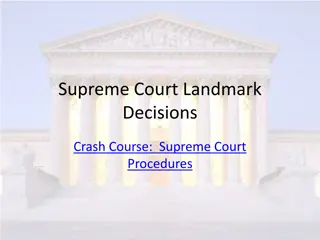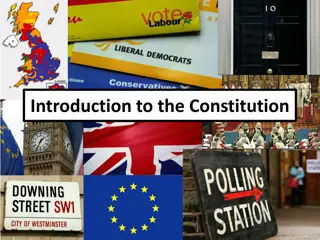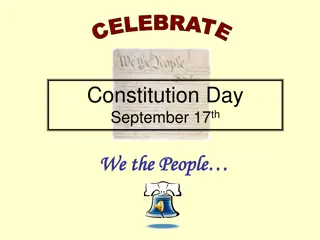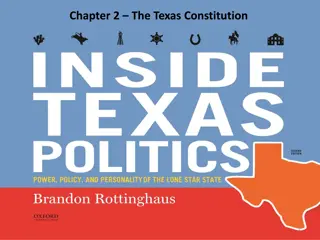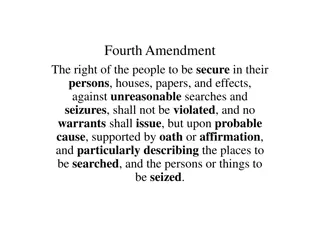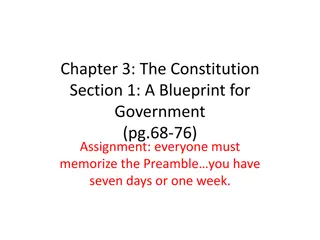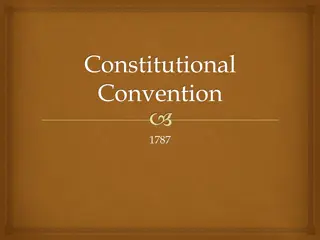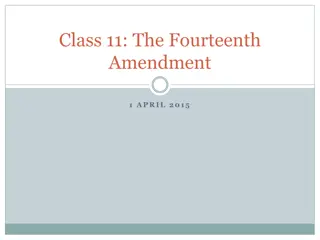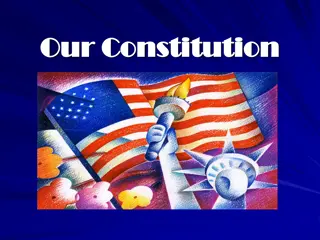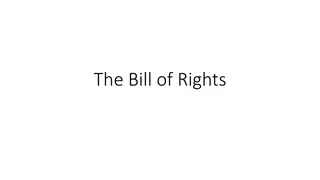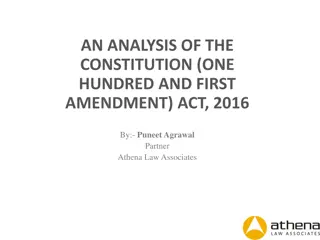The Evolution of the U.S. Constitution: From Jefferson and Madison to Amendment Processes
Jefferson and Madison held differing views on amending the Constitution, highlighting the balance between adaptability and stability. Despite enduring challenges like slavery, the Constitution remains the oldest written constitution. The rigorous amendment process, outlined in Article V, reflects the Founding Fathers' intent to ensure changes are deliberative. Proposals and ratifications require supermajorities, demonstrating the significance of each amendment. Various methods for proposing and ratifying amendments have been utilized, shaping the evolution of the Constitution over time.
Download Presentation

Please find below an Image/Link to download the presentation.
The content on the website is provided AS IS for your information and personal use only. It may not be sold, licensed, or shared on other websites without obtaining consent from the author. Download presentation by click this link. If you encounter any issues during the download, it is possible that the publisher has removed the file from their server.
E N D
Presentation Transcript
Chapter 3: The Constitution Section 2: An Enduring Document (pg.78-83)
Jefferson & Madison on Amending the Constitution Jefferson believed that the Constitution should be able to changed by future generations. On the other hand, Madison pointed out that the longer the Constitution is unchanged the document would gain acceptance and changing the Constitution to often could lead to factions and chaos. https://swifteconomics.files.wordpress.com/2010/07/jefferson-and-madison.jpg
A Document for All Time The Constitution has survived the Civil War, presidential assassinations, and economic crises. It is now the oldest written constitution. However, it included problems that future generations have had to fix Slavery was included, voting rights were withheld from most, and other person liberties were have to be added http://www.nps.gov/inde/historyculture/images/intro-pix_1.jpg
The Amendment Process The Framers knew that future generations would need to change the constitution. In Article V the Constitution gives four ways that the Constitution may be amended. The Framers required each step proposal and ratification have a supermajority or more than just a simple majority They wanted the amendment process to be difficult, there has been 10,000 attempts, 33 have passed Congress and only 27 have passes both Congress and the states http://worcesterherald.com/wp-content/uploads/2014/12/Article-V.jpg
Proposing an Amendment Amendments may be proposed two ways: 1st by Congress with two- thirds of each house & 2ndby delegates at a national convention that is called by Congress at the request of two-thirds of the state legislatures To date only the first method has been used https://encrypted-tbn1.gstatic.com/images?q=tbn:ANd9GcSDL1ymMxFRc3rxDkI4LTSoamyZ0l0BAIzNZCieMFf_ZqbLrmxQ
Ratifying an Amendment There are two methods for ratifying: 1stthree-fourths of state legislatures must approve & 2nd citizens elect delegates to conventions and three-fourths have to approve. The second approach was only used with the 21stamendment http://texaspolitics.utexas.edu/archive/html/cons/features/0405_03/us.gif
The Amendments The first 12 Amendments are the early adjustments to the Constitution Amendments 1-10 were passed in 1791 and protect certain rights from government infringement and are called the Bill of Rights The 11thprotects states from certain lawsuits The 12thfixed the presidential election process http://a5.files.biography.com/image/upload/c_fit,cs_srgb,dpr_1.0,h_1200,q_80,w_1200/MTIwNjA4NjMzODQxMjIzMTgw.jpg http://www.legendsofamerica.com/photos-americanhistory/SamuelAdams.jpg Patrick Henry and Samuel Adams
The Civil War Amendments http://duckofminerva.dreamhosters.com/wp-content/uploads/2013/10/civil-war-soldiers.jpg (1865) The 13th ended slavery (1868) The 14th Defined citizenship, expanded due process, and established equal protection (1870)The 15th Prohibited denying the right to vote because of race, color, or previous servitude
The Progressive Amendments (1913) The 16th Permitted passage of income tax (1913) The 17th Provided for direct election of U.S. senators (1919) The 18th Prohibited production, transportation, and sale of alcohol in (1933 the 21st repealed Prohibition) (1920) the 19th Gave woman the right to vote http://r-house.org/wp/wp-content/uploads/suffragettes201.jpg
The Final Seven http://jolietlibrary.org/sites/default/files/1970sa/18%20Year%20Old%20Vote%202_0.jpg (1933) 20th Changed the date of presidential and congressional terms (1951) 22nd Created presidential term limits (1961) 23rd Washington D.C. got to vote in presidential elections (1964) 24th banned poll tax (1967) 25th Established rules for presidential succession (1971) 26th Lowered voting age to 18 (1991) 27th Rules for congressional pay https://perthgazette.co.uk/wp-content/uploads/2014/10/3541.jpg


